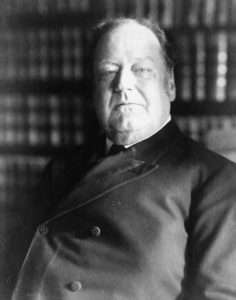The Volokh Conspiracy
Mostly law professors | Sometimes contrarian | Often libertarian | Always independent
Today in Supreme Court History: May 19, 1921
Editor's Note: We invite comments and request that they be civil and on-topic. We do not moderate or assume any responsibility for comments, which are owned by the readers who post them. Comments do not represent the views of Reason.com or Reason Foundation. We reserve the right to delete any comment for any reason at any time. Comments may only be edited within 5 minutes of posting. Report abuses.
Please to post comments



Petrella v. MGM, 572 U.S. 663 (decided May 19, 2014): widow of co-writer of "Raging Bull" entitled to damages for copyright violation despite passage of 18 years since first alleged violation but entitled to only the past three years' damages which is the statute of limitations for the statute allowing damages
Leary v. United States, 395 U.S. 6 (decided May 19, 1969: Marihuana Tax Act of 1937 (Timothy Leary was the accused) unconstitutional because it required persons not allowed to possess marijuana to declare it upon entering the country for tax purposes therefore requiring self-incrimination in violation of the Fifth Amendment (Act was repeated in 1970)
Grubb v. Public Utilities Comm'n, 281 U.S. 470 (decided May 19, 1930): wrongful denial of application for proposed interstate bus line could be litigated in state court because federal court did not have exclusive jurisdiction over interstate commerce
Anderson v. Carkins, 135 U.S. 483 (decided May 19, 1890): Homestead Act violated by contract to sell land when seller (who had obtained the land from the government under the Act) lied about it being for his own use as required by the Act
Emsheimer v. New Orleans, 186 U.S. 33 (decided May 19, 1902): diversity jurisdiction is measured by residence at the time suit is filed, and is not voided by subsequent move (dispute over promissory note)
Fillippon v. Albion Vein Slate Co., 250 U.S. 76 (decided May 19, 1919): reversible error for judge to give instruction to jury without parties and their counsel being present (suit was for workplace injury)
Inyo County v. Paiute-Shoshone Indians of Bishop Community, 538 U.S. 701 (decided May 19, 2003): tribe could not sue under 42 U.S. §1983 because it protected only private persons and not sovereigns (issue was whether tribe had to comply with search warrant for records of employee accused of welfare fraud)
White's poor pallbearers...their poor backs...
What a mean spirited and discriminatory remark.
"Petrella v. MGM, 572 U.S. 663 (decided May 19, 2014): widow of co-writer of "Raging Bull" entitled to damages for copyright violation despite passage of 18 years since first alleged violation but entitled to only the past three years' damages which is the statute of limitations for the statute allowing damages"
Talk about waiting a long time...the Court itself seems to have waited a long time to clear up this issue, which I would assume would have been the cause of a lot of headache and litigation before the Court decided it.
That was not the central holding of the case, and the three-year principle was not at issue. (If I sued Led Zeppelin, claiming I wrote "Stairway to Heaven", and I won the case, I would not be entitled to back royalties for sales and airplay since 1971, but only going back three years and going forward.)
The main issue in the case was whether laches was available as a defense in a copyright claim. A 6-3 Court held it was not. It was interesting lineup. Justice Ginsburg wrote the majority opinion, joined by Scalia, Thomas, Alito, Kagan, and Sotomayor. The dissent was written by Justice Breyer, joined by Roberts and Kennedy.
The central holding was whether she had lost her rights by waiting for 18 years.
And what is the word for the equitable defense that a plaintiff has waited an unreasonable amount of time to assert her claim?
Yes, but it was not a general holding as to laches.
White was appointed an Associate Justice by Democratic President Grover Cleveland in 1894. He would later be promoted to Chief Justice by Republican President William Howard Taft in 1910.
Democrats would later reciprocate the gesture when Associate Justice Harlan Stone, who had been appointed by Republican President Calvin Coolidge in in 1925, was promoted to Chief Justice by Democratic President Franklin Roosevelt in 1941.